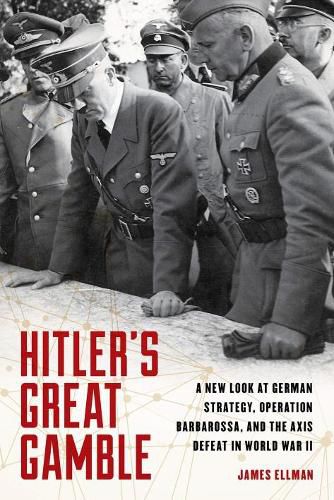Readings Newsletter
Become a Readings Member to make your shopping experience even easier.
Sign in or sign up for free!
You’re not far away from qualifying for FREE standard shipping within Australia
You’ve qualified for FREE standard shipping within Australia
The cart is loading…






On June 22, 1941, Hitler invaded the Soviet Union in Operation Barbarossa, one of the turning points of World War II. Within six months, the invasion bogged down at the gates of Moscow, and the Eastern Front proved to be the decisive theater in the defeat of the Third Reich. Ever since, most historians have agreed that this was one of Hitler’s great mistakes. In Hitler’s Great Gamble, James Ellman argues that Barbarossa was a gamble, but that it was not doomed from the start: that it was a reasonable gamble spoiled not by strategic shortsightedness, but by diplomatic setbacks and poor execution.
In Ellman’s recounting, the invasion of the Soviet Union was not a doomed act of madness or hubris, but a logical gamble that maximized the Third Reich’s attempts at achieving its war aims, however perverted, of living space and subjugating the Slavs. Had Finland and Japan made good on their alliance with Germany - had Hitler been more committed to diplomacy and not military invasion - Germany might well have succeeded in defeating the Soviet Union and, perhaps, winning World War II. Drawing on a wealth of primary and secondary sources (including many recently released), Hitler’s Great Gamble is a provocative work that will appeal to a wide cross-section of World War II buffs, enthusiasts, and historians.
$9.00 standard shipping within Australia
FREE standard shipping within Australia for orders over $100.00
Express & International shipping calculated at checkout
On June 22, 1941, Hitler invaded the Soviet Union in Operation Barbarossa, one of the turning points of World War II. Within six months, the invasion bogged down at the gates of Moscow, and the Eastern Front proved to be the decisive theater in the defeat of the Third Reich. Ever since, most historians have agreed that this was one of Hitler’s great mistakes. In Hitler’s Great Gamble, James Ellman argues that Barbarossa was a gamble, but that it was not doomed from the start: that it was a reasonable gamble spoiled not by strategic shortsightedness, but by diplomatic setbacks and poor execution.
In Ellman’s recounting, the invasion of the Soviet Union was not a doomed act of madness or hubris, but a logical gamble that maximized the Third Reich’s attempts at achieving its war aims, however perverted, of living space and subjugating the Slavs. Had Finland and Japan made good on their alliance with Germany - had Hitler been more committed to diplomacy and not military invasion - Germany might well have succeeded in defeating the Soviet Union and, perhaps, winning World War II. Drawing on a wealth of primary and secondary sources (including many recently released), Hitler’s Great Gamble is a provocative work that will appeal to a wide cross-section of World War II buffs, enthusiasts, and historians.